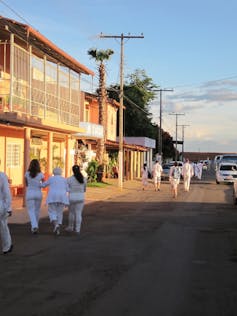His eyes were very big and very blue, the colour of cornflowers. They were neither kind nor unkind, and seemed somehow apart from the rest of his puffy face and sagging body. He looked into my eyes, and when I did not look away, he looked deeper and said, so quickly I nearly missed it, “Volta na tarde”. Come back this afternoon.
I felt special. I had watched the people ahead of me in line approach and be sent away with scribbled prescriptions for passiflora – a herbal medicine. I returned after lunch, and I watched him scrape a man’s eyeball with a scalpel and I fainted.
When I came to, the soft-voiced people looking after me told me I’d had a “spiritual surgery”. They took my money to buy me my own course of passionflower pills, then sent me back to my pousada (guesthouse) to rest.
I can’t help but wonder now, what if I hadn’t fainted? What if I’d passed in front of him again, and what if he’d invited me for a private consultation, and what if I’d said yes?

#MeToo catches up with João de Deus
João Teixeira de Faria, popularly known as João de Deus, or John of God, is the most famous medium in Brazil. He inherited his title from his mentor – the beloved philanthropist Chico Xavier – and garnered attention from dozens of celebrities and politicians, including Oprah Winfrey.
Over the past four weeks, more than 600 women have accused Teixeira of sexual assault. Their ages at the time of the alleged assaults, which took place from the 1980s through October 2018, range from nine to 67. Though Teixeira has denied the allegations, all recount him inviting them for private consultations, turning them to face away from him, and then performing sexual acts as part of their “cure”.

Presently, Teixeira is being investigated for rape, sexual violation through fraud and illegal possession of arms. So far, he has been charged with two counts of rape and two counts of statutory rape.
In past encounters with the international press, he was treated as a unique New Age healer something encouraged by his team of savvy advisors.
However, despite this international reputation, Teixeira actually inhabits a very central, even ordinary, place in the Brazilian religious landscape, shaped over centuries by Afro-Brazilian, indigenous, European, and (more recently) North American currents. He is a “spiritual surgeon” – a role at the intersection of folk Catholicism and Brazilian Spiritism.
An economy of abuse
Teixeria’s “spiritual hospital” in the small town of Abadiânia, halfway between the major cities of Brasília and Goiânia, is called the Casa de Dom Inácio de Loyola after Saint Ignatius who founded the Jesuits, one of the 37 spirits Teixeira claims to incorporate into his body during trances. A benefactor secured land for him there in 1979, and the small town of 19,000 now receives 10,000 visitors a month, most of them foreigners.

The John of God economy here is extensive. There are the bottles of blessed water, the passionflower pills, the guided tours, the pousadas to house visitors, the cafes to feed them, the shops selling the requisite white clothes, the mineral and jewellery shops and the bookshops selling videos, biographies, photographs, crystals and icons.
Then there’s the money from his regular international tours. As a result, many people make their living off the work of John of God.
Money and power in Bolsonaro’s Brazil
Now that Brazil has sworn in a president who campaigned on his support for Brazilian evangelicals and the slogan “God above everyone”, there’s the temptation to connect the crowning of Bolsonaro with the fall of John of God.
It is possible to find an intersection between the John of God economy and Brazilian evangelicalism. While evangelicals are firmly against spiritual power that comes from anywhere other than Jesus or his Holy Spirit, they do share Teixeira’s evident comfort with the symbiotic relationship between wealth and faith.
But the same could be said for all of the major religions shaping Brazil. Whether in Catholic traditions of paying for funeral masses or Afro-Brazilian customs of cooking extravagant feasts for the gods, money and faith have historically sat side by side.
The real story here has nothing do with with Bolsonaro or evangelicals, and it is not about just another sex-crazed cult leader either. It is an older and more universal one, with as many similarities to the Catholic Church as to any cult – the story of the exploitation of women of faith by a man enabled by a large network of people dependent on him for money and power.

The women Teixeria is alleged to have assaulted were not uniquely gullible or vulnerable. Most of them believed he could help them, but their belief does not make them outliers – healing through contact with the spirit world is a mainstream position in Brazil. Even the sceptical, like me, can be lulled into credulity by the John of God machine. They tell you to be open, to allow the Entity to read your energy and recognise what you need.
Even if you think it’s nonsense, there may still a part of you that says “what if?” Imagine hearing a ghost story, late on a moonless night, in a candlelit cabin with creaky floors. It’s that frame of mind. I can imagine that if I had been invited for a one-on-one consultation, I would have accepted. Even suspecting the whole thing was a hoax, what’s the worst that could happen?

